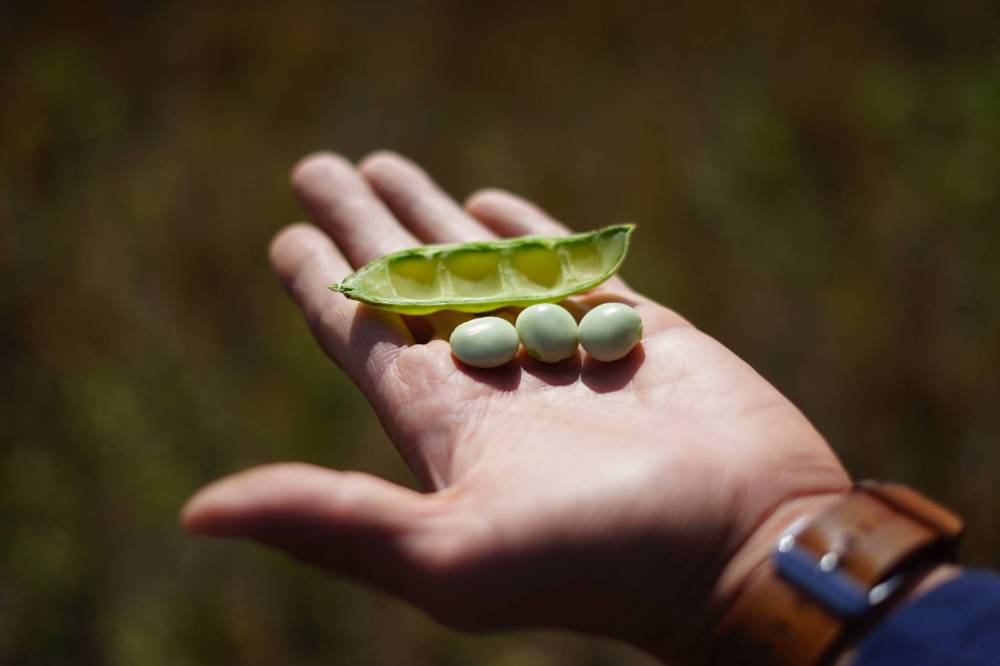I scream, you scream, we all scream for… lupin? BDI’s non-dairy frozen alternative made with protein from legume starting to make inroads in Canadian market
Read this article for free:
or
Already have an account? Log in here »
To continue reading, please subscribe:
Monthly Digital Subscription
$0 for the first 4 weeks*
- Enjoy unlimited reading on winnipegfreepress.com
- Read the E-Edition, our digital replica newspaper
- Access News Break, our award-winning app
- Play interactive puzzles
*No charge for 4 weeks then price increases to the regular rate of $19.00 plus GST every four weeks. Offer available to new and qualified returning subscribers only. Cancel any time.
Monthly Digital Subscription
$4.75/week*
- Enjoy unlimited reading on winnipegfreepress.com
- Read the E-Edition, our digital replica newspaper
- Access News Break, our award-winning app
- Play interactive puzzles
*Billed as $19 plus GST every four weeks. Cancel any time.
To continue reading, please subscribe:
Add Free Press access to your Brandon Sun subscription for only an additional
$1 for the first 4 weeks*
*Your next subscription payment will increase by $1.00 and you will be charged $16.99 plus GST for four weeks. After four weeks, your payment will increase to $23.99 plus GST every four weeks.
Read unlimited articles for free today:
or
Already have an account? Log in here »
Hey there, time traveller!
This article was published 11/08/2023 (850 days ago), so information in it may no longer be current.
It swirls like a vanilla soft serve. It comes in the same cup or cone as a vanilla soft serve.
Bridge Drive-In, the University of Manitoba and a Calgary-based business have jointly tried their best to replicate the vanilla soft serve.
The dairy-free alternative BDI sells is brand new. It’s likely the first Canadian ice cream shop to create a lupin-based frozen dessert, tying itself to a blossoming industry.
Lupin is a legume often used in the Mediterranean. Canada has begun importing the crop from Europe.
Lupin is being imported from Europe, to be grown in Canada as a high-protein plant source.
“I think every year, our non-dairy sales increase,” said Justin Jacob, BDI’s owner.
A single week might elicit 300 orders of dairy-free dessert — in a cone, or a banana split or a hot fudge sundae (with dairy-free chocolate sauce, of course).
The problem: BDI’s mix was, as Jacob described, just “OK.”
“It at least provided a soft-serve alternative that was dairy-free,” he added.
The Winnipeg summer institution would receive shipments of coconut-based powder that staff would mix with water. As dairy-free orders gained popularity, Jacob searched for a new recipe.
In 2021, he began visiting a dairy plant at the University of Manitoba, exploring oat milk as an ice cream substitute.
It wasn’t a long-term solution.
“We couldn’t find anywhere to buy bulk oat milk, so we were literally just going to the Sobeys and buying oat milk off the shelves,” Jacob said.
To keep dairy-free prices comparable to regular ice cream, BDI would have to produce its own oat milk or find a different alternative, he figured.
That realization, plus persistent pandemic-era lockdowns, led Jacob to scrap the project altogether. Coconut soft serve it was.
BDI owner Justin Jacob serves up a cone of lupin-bean frozen dessert. 
Meantime, a movement to sell lupin products was growing in Canada.
“Lupin… shows a lot of potential,” Bill Greuel, the CEO of Protein Industries Canada, wrote in a statement.
In 2021, Protein Industries Canada announced a $7.3 million project, led by four businesses, to build Canada’s lupin supply chain.
Lupin Platform is among the four organizations tasked with constructing Canada’s lupin industry, along with Hensall Co-op, Lumi Foods and Puris.
“I think we are really well-positioned,” said Tristan Choi, Lupin Platform’s CEO. “We’re really trying to… develop a market, but there has to be an education piece.”
He vocalized the benefits of lupin — it’s a high-protein plant, and it’s resistant to Aphanomyces root rot, a disease that can devastate pea crops.
“It all depends on consumer response to the products and how effective the food scientists are at creating products that people are going to buy.”–Dylan MacKay
White lupin captures nitrogen from the air and transports it to soil; it’s a natural fertilizer, Choi said. It can aid in crop cycling.
Dylan MacKay, a University of Manitoba food and human nutritional sciences professor, compared lupin’s protein content — about 35 per cent of the bean — to soy’s, calling both “higher-protein pulses.”
“There is quite a large push towards plant-based protein,” MacKay noted. “Lupin will likely continue to pick up a… larger share of that, but it all depends on consumer response to the products and how effective the food scientists are at creating products that people are going to buy.”
That’s Lupin Platform’s territory: it’s contracting farmers to grow lupin, and it’s testing new products in laboratories.
There are 1,000 acres of commercial lupin fields in Canada this year, Choi said. He’s hoping to triple production next year and involve Manitoba.
Last year, the Keystone Province held 400 acres of lupin space. The Prairies are ideal because of farm prices and an already established pea industry, Choi said.
“It’s still in the preliminary stages. The product can be made better… It’s pretty good so far.”–Justin Jacob
“(This is) truly Canada-wide,” he added — there are around 14 lupin test sites, including in Quebec and Prince Edward Island.
Lupin Platform processed 100 metric tons of lupin last year, according to Choi. Lupin is ground into flour and converted to protein isolate.
Lupin-based cheese and pasta, pickled lupin, muffins and pancakes made with lupin flour — all are undergoing testing with the eventual goal of selling in stores.
Choi connected with University of Manitoba inventors roughly three years ago.
“We were working with them to develop some food ideas,” he said.
This lupin-bean frozen dessert at the BDI, made at the University of Manitoba, is unique in Canada.
Sweet lupin was put in the spotlight.
“It’s not as simple as swapping out (dairy),” said John Thoroski, manager of the university’s dairy plant.
He’s used oats, sunflowers and almonds as dairy substitutes. There’s a balance creators must find — the right blend of carbohydrates and fats and stabilizers, among others, Thoroski said.
First, his team worked on lupin milk and hard ice cream. Then, they were introduced to Jacob from BDI and asked to make soft serve.
Jacob had met with Lupin Platform and, last fall, decided to try its soft serve. He and BDI employees regularly visited the University of Manitoba’s dairy plant, testing samples and providing feedback.
Lupin has a distinct flavour that’s “hard to describe,” Jacob said. “When you’re combining flavours (like vanilla), you have to be mindful of that.”
Even so, the finish line to vanilla and chocolate lupin desserts came fast. It turned out better than past products, Thoroski said.
“It’s still in the preliminary stages. The product can be made better,” he noted, adding “it’s pretty good so far.”
BDI has served hundreds of lupin cones this summer, softly launching the product on opening day. The shop’s menu doesn’t advertise lupin dessert — it’s simply handed over when customers ask for dairy-free.
“It’s the closest thing we’ve been able to come up with,” Jacob said. “The taste is a little different from dairy.”
Lauren Brown couldn’t pinpoint the flavour, pondering as she scooped the dessert from a BDI cup.
“(It’s) good,” she said.
“Definitely vanilla,” Mary Dempke, Brown’s grandmother, remarked beside her.
Brown passed the cup to her parents, who gave their own reviews: the texture isn’t quite the same as regular ice cream, but it’s a good dairy-free alternative.
Strawberry lupin dessert is next on BDI’s list, Jacob said.
"Lupin has a distinct flavour that’s 'hard to describe,'” Justin Jacob, owner of the BDI said. “When you’re combining flavours (like vanilla), you have to be mindful of that.”
Lupin processing can be expensive — Canada lacks protein extraction infrastructure, Choi said.
He wouldn’t divulge processing costs. However, lupin protein can cost $7 to $20 per ton, depending on the type, Choi said.
Industry extracted approximately 24 metric tons of lupin protein from the 100 metric tons it had processed, Choi added.
Lupin Platform is overseeing the industry’s development, among other things. Hensall Co-op is undertaking agronomic research and crop testing; Lumi Foods and Puris will develop new plant-based products, Protein Industries Canada’s announcement outlined in 2021.
BDI will continue making lupin ice cream as long as the material is available, Jacob said.
gabrielle.piche@winnipegfreepress.com

Gabrielle Piché reports on business for the Free Press. She interned at the Free Press and worked for its sister outlet, Canstar Community News, before entering the business beat in 2021. Read more about Gabrielle.
Every piece of reporting Gabrielle produces is reviewed by an editing team before it is posted online or published in print — part of the Free Press‘s tradition, since 1872, of producing reliable independent journalism. Read more about Free Press’s history and mandate, and learn how our newsroom operates.
Our newsroom depends on a growing audience of readers to power our journalism. If you are not a paid reader, please consider becoming a subscriber.
Our newsroom depends on its audience of readers to power our journalism. Thank you for your support.
